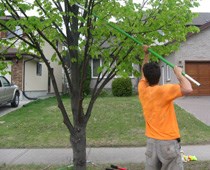THUNDER BAY – The City of Thunder Bay will take another look at the possibility of meeting its tree-growing needs locally, after city council reversed course on a previous vote Monday.
In December, councillors narrowly rejected a proposal from city administration to run a tree nursery in-house. Coun. Peng You, who has championed the idea, had moved to reconsider that vote.
Councillors skeptical of the plan were brought on board Monday with a motion to instead further explore interest from the private sector in the region.
The in-house nursery would have initially cost over $100,000 a year, but was estimated to eventually save the city money, paying off after about two decades while producing higher-quality trees and helping meet municipal climate commitments.
Coun. Shelby Ch’ng, who was absent from the original Dec. 6 vote, expressed frustration council hadn’t moved forward with the in-house nursery, calling it “low-hanging fruit.”
“I’ve witnessed first-hand how the trees all died in the south core because they’re not suited to this environment – we brought them in from somewhere else,” she said. “I’d like to do something different, something that upholds the net-zero strategy we promised the community. I really don’t see this as stepping on anyone’s toes, because there really is no industry here, and Thunder Bay shouldn’t concern itself with businesses in Southern Ontario."
Director of engineering Kayla Dixon said in some capital projects, as many as 50 per cent of trees brought in had died, while cautioning the figure wasn’t necessarily representative. The city has encountered issues like gypsy moths in trees purchased from suppliers in southern Ontario.
Coun. Mark Bentz noted while the current arrangement wasn’t ideal, it did shield the city from a level of risk, pointing out suppliers are currently obligated to replace low quality trees.
However, parks manager Cory Halvorsen suggested there would also be clear benefits to locally grown trees.
“It is a commonly known requirement when you’re planting trees that where you’re sourcing them from is directly relevant to their success,” he said.
Coun. Albert Aiello argued the city had to do more work to offer the opportunity to entrepreneurs, saying “there’s definitely a business opportunity there.”
Halvorsen said the city had done some “local outreach” without success, but had not issued a formal expression of interest or request for information process.
Previous tenders for individual contracts to supply trees to the city have attracted little interest from Northwestern Ontario, he said, but some councillors suggested suppliers could find the prospect of a long-term deal to supply trees to the city more attractive.
“I think we have to extend that net and have a meaningful discussion with our local and district providers of trees,” said Aiello. “Because you may be surprised.”
The city’s tree needs are expected to be substantial, with commitments to plant 100,000 trees by 2050 under its net-zero climate plan and to replace around 4,600 trees through the emerald ash borer program, as well as regular planting and replacement operations.
Halvorsen estimated the in-house nursery could eventually trim per tree costs from an average of $350 to around $200, eventually saving $150,000 a year and meeting 50 per cent of the city’s needs.
Coun. Rebecca Johnson moved Monday to explore issuing a Request for Information to gauge interest from the private sector in supplying the city’s tree needs.
With administration saying the pandemic is badly straining city staff capacity, a report back on that process isn’t expected to come to council until June 6.
